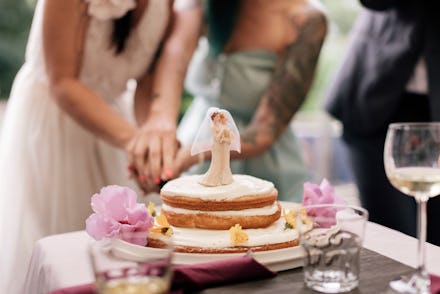Marriage felt like an erasure of my bisexuality

As a bisexual woman, I always assumed that I would never get married. From a young age, I knew that I would never be able to choose just one gender to love. I always wanted to be able to choose both. Instead, I chose one at a time. First, I married a man and then I married a woman. As you can probably tell from the past tense, neither marriage worked out so well. It’s been asserted by experts, as well as writers from in and outside of the community, that marriage and bisexuality might not go hand-in-hand. New research even suggests that bisexual people may not reap the same health benefits from marriage as gay or straight people, the interpretations based on the self-reported mental and physical health of those surveyed.
The theory that bisexual folx aren’t as healthy as gay or straight folks isn’t news. Trying to squish the complexity and nuance of your sexuality into an easily google-able search term doesn’t always feel healthy. There is definitely a burden in fighting myths about bisexual people as confused, greedy, or in denial. What’s new is that marriage, which is generally a boon, actually seems to not to do much for bisexual individuals. Why aren’t we experiencing a legal union as a health perk like everyone else appears to be? Experts postulate that it could be due to the various stressors involved of being part of a stigmatized demographic.
Part of me agrees. The same family that celebrated my straight marriage in three cities straight-up did not attend my gay wedding. Describing their notable absence as “stressful” in a way that could impact my health seems like an understatement.
And another part of me wants to point out that all this partitioning feels really alienating. Could the bifurcating “bi” in bisexual be the actual problem? Even this simple use of language feels like an unnecessary surgery: Let’s cut you in half; one will like girls and one will like boys. One can marry a man and the other can marry a woman. The fact, though, is that there’s actually just one of me and the institution of marriage doesn’t account for my identity, which resists being bisected.
I am not many different people stitched together, but instead one complex being that is attracted to all the genders. Being asked to be less complicated requires an amputation. Being married made me feel like I had to split into separate selves and only occupy whichever one was considered valid at the time. One part of me would walk around holding hands with a partner, smiling and happy, but the other never disappeared. My evident bisexuality haunted me like a ghost, reminding me that I can’t be contained in the inherently inflexible box of marriage.
One part of me, I believe, will always be excluded from marriage; a rite intended to solidify social structure simply cannot account for ambiguity.